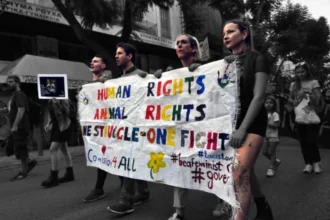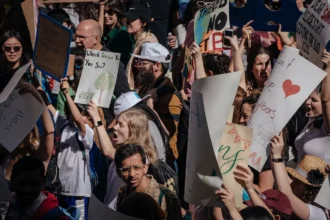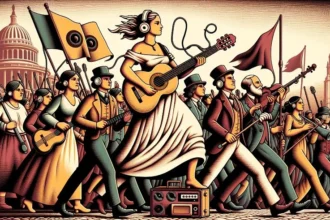In the era of climate strikes, digital activism has become a powerful tool for mobilizing collective action. The Fridays For Future (FFF) movement, led predominantly by young activists, has been at the forefront of this digital revolution.
While the movement has been successful in raising awareness about the climate crisis, it has also inadvertently served as a platform for Human Rights Education (HRE). The climate crisis is not just an environmental issue; it’s a human rights issue that affects everyone, regardless of age, race, or nationality.
The right to a clean and healthy environment, access to clean water, and adequate housing are all human rights that are jeopardized by climate change. However, our study reveals a gap in the discourse.
While FFF has been effective in educating its participants about the climate crisis, it has not necessarily broadened their understanding of the human rights dimensions of the issue. This raises questions about how digital activism can be more effectively leveraged to foster a comprehensive understanding of human rights.
Methodology: A Deep Dive into Digital Activism
To delve deeply into the intricate relationship between digital activism and Human Rights Education (HRE), we embarked on a comprehensive investigation that scrutinized various facets of climate strikes and assemblies spearheaded by the Fridays for Future (FFF) movement.
Our research extended beyond mere observation, diving into the nuances of content disseminated across multiple social media platforms, the dynamics of interactions among activists, and the emergence of collective action frames that guided the movement’s objectives and strategies. Employing a robust methodological framework that combined both qualitative and quantitative research techniques, our study incorporated content analysis, one-on-one interviews, and participant surveys to offer a holistic view.
The overarching goal of our research was to dissect how these digital platforms serve dual roles: first, as arenas for political mobilization and advocacy, and second, as transformative educational spaces that influence and shape our collective understanding of human rights.
By doing so, we aimed to shed light on the pedagogical opportunities and challenges that digital activism presents within the broader landscape of Human Rights Education. Our findings, therefore, serve as a critical resource for educators, activists, and policymakers, offering nuanced insights into the educational potentialities and constraints of digital activism in shaping a more informed and engaged citizenry.
The Concept of ‘Climate Competence’
Expanding on the concept of ‘climate competence,’ our research delves into the multifaceted ways in which activists involved in digital strikes acquire a nuanced understanding of the climate crisis. Through their active engagement in online platforms, where they post photographs holding signs and employ specific hashtags, activists not only express their commitment to environmental causes but also contribute to a collective discourse on climate change.
This digital participation serves as an informal educational space, allowing activists to internalize key aspects of climate science, policy implications, and the urgency of taking action.
Yet, it’s crucial to note that this acquired ‘climate competence’ often remains confined to the environmental dimensions of the crisis. While activists gain a robust understanding of climate change’s scientific and ecological facets, they frequently overlook the human rights implications, such as the right to clean water, health, and housing. This represents a significant gap in their educational journey, as the climate crisis is intrinsically linked to various human rights that are jeopardized due to environmental degradation.
Therefore, while ‘climate competence’ is a valuable asset in the toolkit of digital activists, it is not a panacea. It needs to be complemented by a broader ‘rights consciousness’ that encapsulates the human rights dimensions of environmental issues.
This expanded understanding is essential for activists to effectively advocate for comprehensive solutions that address not only the environmental but also the social and ethical aspects of the climate crisis. By doing so, digital activism can evolve into a more potent force that not only raises awareness about climate change but also champions the interconnected human rights that are at stake.
The Missing Link: Rights Consciousness
In our exploration of the FFF movement’s impact on digital activism, we found a conspicuous absence of what we term ‘rights consciousness’ among activists. While the movement has been remarkably successful in galvanizing public attention toward the urgency of the climate crisis, it has been less effective in framing these environmental concerns within the broader context of human rights.
Activists are adept at discussing the dire need for clean air, water, and sustainable living, but these discussions often lack a human rights perspective. Rarely do activists articulate that access to clean water, for example, is not just an environmental necessity but a fundamental human right enshrined in international law.
This absence of ‘rights consciousness’ represents a critical gap in the current discourse of digital activism. The focus remains largely on environmental degradation, climate change, and ecological balance, without extending into the realm of human rights that are directly or indirectly affected by these issues.
For instance, the right to health, the right to adequate housing, and even the right to life are all jeopardized by the climate crisis. Yet, these rights are seldom mentioned in the narratives constructed within the digital platforms used by the FFF movement.
Addressing this missing link is not just an academic exercise; it has practical implications for the efficacy of digital activism in the realm of Human Rights Education (HRE). By incorporating a ‘rights consciousness’ into their advocacy, activists can present a more holistic view of the climate crisis—one that includes its impact on human rights.
This would not only enrich the discourse but also empower activists to demand accountability from governments and corporations for human rights violations linked to environmental issues. In doing so, digital activism can serve as a more comprehensive educational tool, fostering a nuanced understanding of the interconnectedness between environmental sustainability and human rights.
Experiential Learning: The Role of Social Media
Social media platforms offer a unique space for experiential learning, a concept rooted in the idea that learning is most effective when it is active, participatory, and situated in real-world contexts. According to Experiential Learning Theory (ELT), learning occurs through a cycle of concrete experiences, reflection, and experimentation.
In the context of digital activism, social media platforms provide a fertile ground for such experiential learning. They allow activists to engage with and reflect upon their actions, thereby deepening their understanding of both the climate crisis and their right to peaceful assembly. This has significant implications for Human Rights Education, suggesting that digital platforms can serve as effective educational spaces.
The Hybrid Nature of Activism
Digital technologies have blurred the lines between online and offline activism, creating a continuum of possibilities for engagement and participation. This hybrid nature of modern activism has implications for how we understand the right to peaceful assembly in the digital age.
Activists who participate in digital strikes often extend their activism to offline actions, such as beach clean-ups or tree planting. This shows the fluidity and adaptability of modern activism, which is no longer confined to specific spaces or platforms. It also raises questions about what counts as meaningful participation and how Human Rights Education can adapt to these emerging forms of political engagement.
The Pedagogical Challenge for HRE
The challenge for Human Rights Education (HRE) extends beyond merely adapting to new forms of political engagement; it involves a fundamental rethinking of pedagogical strategies to encompass the dynamic landscape of digital activism.
Traditional educational frameworks often fall short in equipping young activists with the nuanced understanding and practical skills required for effective online advocacy. Therefore, HRE must undergo a transformative shift to incorporate experiential learning opportunities that focus on the actual exercise of rights in both online and offline spaces.
This enriched pedagogical model acknowledges the evolving capacities of children and young people as not just future citizens but as present-day change-makers. It calls for an integrated approach where HRE is woven into the fabric of digital activism, ensuring a holistic grasp of human rights issues. This not only empowers young individuals to contribute meaningfully to the discourse but also enriches the collective intelligence of social movements.
Intergenerational Dialogue: The Future of Activism
Our study underscores the potential of digital activism in fostering intergenerational dialogue. The digital space allows for interactions between young activists and adults, facilitating knowledge exchange and capacity-building. This creates spaces for HRE that not only educate about rights but also help in the development of a collective identity and community connections.
Such spaces enable members of grassroots movements to develop a coalitional agency, allowing them to collectively fight for the rights of all. This has significant implications for the future of activism, suggesting that digital platforms can serve as catalysts for large-scale collective actions and worldwide mobilizations.
In conclusion, our study reveals that while digital activism offers unique opportunities for Human Rights Education, it also presents challenges that need to be addressed. As we navigate this digital frontier, it’s imperative that we integrate human rights education into our collective action, turning our ‘climate competence’ into a broader ‘rights consciousness.’
Adapted from an academic article for wider audience, under license CC BY 40









